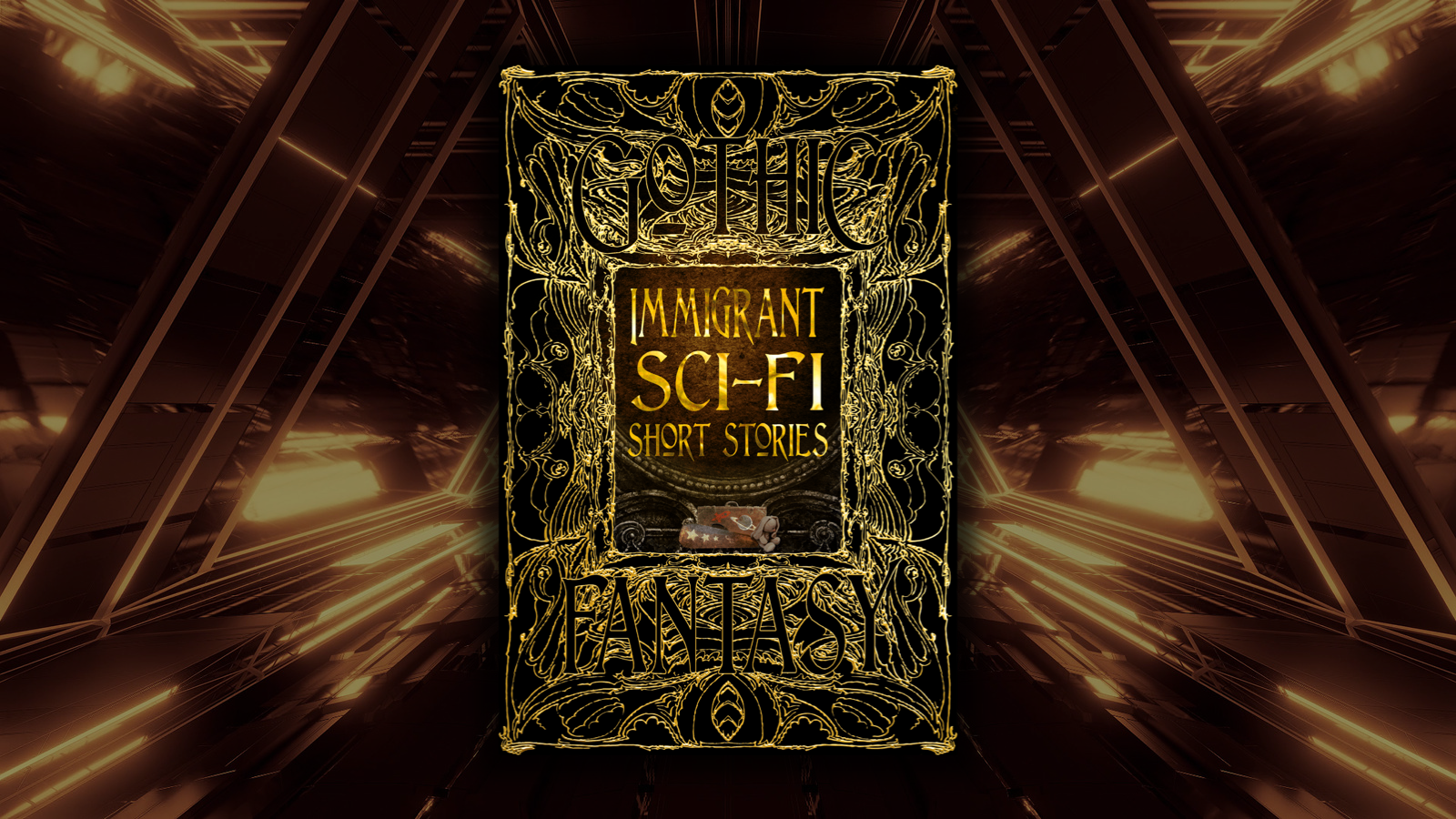Our latest anthology Immigrant Sci-Fi, available to buy now, contains new, recent and classic tales that explore the world (and outer space) from the perspective of the incoming, examining visions of displacement and relocation in future and speculative settings. In last week’s Q&A, modern authors from the book described the various inspirations behind their included story. This week, they’re back to tell us how their writing comes into being, as well as to recommend other Sci-Fi and migrant stories that have left an impact.

What are your favourite stories from this genre?
Elana Gomel
I love science fiction and fantasy written on the margins, by people whose life experience spans different cultures, countries, and languages. Who can better write about aliens than people alienated from their roots: global wanderers, immigrants, and exiles? Some of my favourite writers are people who write in English even though it is not their mother tongue: Lavie Tidhar (an Israeli who lives in England), Artyom Dereschuk, a Russian horror writer, and Gustavo Bondoni, an Argentinian.
Jennifer Hudak
My story in this anthology originally appeared in khōréō, a speculative magazine focusing on migration, and I want to encourage everyone to read that magazine, because all of the stories are just wonderful. Particular favourites are ‘The Frankly Impossible Weight of Han’ by Maria Dong and ‘Nine-Tailed Heart’ by Jessica Cho. I also want to recommend The World to Come by Dara Horn, an absolutely magical novel that explores Jewish migration and diaspora, the art of Marc Chagall, and Jewish beliefs about the world beyond death.
Bogi Takács
Some of my favourite recent works related to migration written by migrant writers are Freshwater by Akwaeke Emezi, Chaos, Crossing by Olivia Elias (translated by Kareem James Abu-Zeid), Iep Jaltok: Poems of a Marshallese Daughter by Kathy Jetn̄il-Kijiner, and probably quite a few I’m forgetting! My favourite Hungarian novel by a migrant author is A fájdalom kövei by Anwar Hamed – I hope one day it can be translated into English.
Eileen Gonzalez
My favourite sci-fi stories tend to be much lighter than what I have written in Immigrant Sci-Fi. Douglas Adams is an all-time favourite. But when it comes to fiction, I prefer comic books to prose. Far Sector by N.K. Jemisin and Jamal Campbell blew me away, and I like old-school superhero comics in general (so I was naturally excited to hear that Otto Binder, co-creator of Supergirl, was in this collection!).
Samara Lo
Sci-Fi books and shows that I’ve enjoyed recently include Mary Robinette Kowal’s The Lady Astronaut series and The Spare Man, The Last Cuentista by Donna Barba Higuera, The Three Body Problem by Cixin Liu (translated by Ken Liu) and the Foundation series (based loosely on Isaac Asimov’s series).
Alex Gurevich
First and foremost, I would go back to Tolkien, where elves, humans, dwarves, hobbits, and even ents experienced displacement, whether it was chosen or forced. As for television, Battlestar Galactica stands out for its portrayal of the refugee experience.
Jas Kainth
I was initially drawn to the Science Fiction genre through the works of Stephen King – particularly the iconic Under the Dome – which have helped to form my understanding of the genre and its exploration of sociocultural themes. My children are avid fans of Stranger Things so, by hook or by crook, I’ve found myself lost within these Sci-Fi worlds at every turn.
C.R. Serajeddini
I cry every time I read Ken Liu’s The Paper Menagerie. Avatar is a great movie. Another favourite of mine is Resident Alien – the television series! That show deals with so many moral issues. Plus, Alan Tudyk is just awesome.
Louis Evans
I adore Vonda McIntyre’s ‘Little Faces’, which is another (very different) exploration of how space and biotechnology might transform how we love and how we reproduce. McIntyre’s protagonist, Yalnis, faces a tighter net and ultimately takes more decisive action than my mother and my doctor; but there is, I hope, something akin in the endings.
Ali Abbas
I’m in awe of Jorge Luis Borges’s The Aleph & Other Stories. I love the first-person narrative laced with magic. There’s a density and beauty to his prose that I can’t match, but its existence seems to give me permission to write my own.
Kevin Martens Wong
To my own understanding, I actually haven’t read very much from the immigrant sci-fi genre in itself, but at least in terms of other works that deal with liminal and/or post-colonial or posthuman communities in transience, evolution, collision and tension, China Miéville’s Bas-Lag trilogy and The City & The City were definitely formative influences on me when I was starting out, as well as Nancy Palmer’s The Ear, The Eye, and the Arm, and Nalo Hopkinson’s Midnight Robber.
Can you tell us a little about your writing process?
Francesco Verso
In the past, I was writing almost every day but now I prefer to concentrate the writing during 4-5 weeks of the year and then edit the text when I have some spare time. I tend to develop ideas and the plot of the story on a separate file, and at times even write the complete summary of each chapter, then I concentrate on writing the actual text following a detailed outline. I found this method much more efficient for my personal schedule. I wrote 4 novels following this process.
P.A. Cornell
My process varies from story to story, but in general I like to work somewhere with good natural light, and I write on a laptop so I can easily move if needed. I don’t force myself to write daily, but when not writing I’m thinking about my stories so that when I sit down to work, I produce a lot very quickly. While I might tweak a line or two as I go, the bulk of my editing is done once I have a finished first draft.
Roy Gray
I use the oldest version of MS word because it is very simple. Later versions have too many ‘bells and whistles’. I only write short stories. If one begins to look like a novel I stop. I write a chunk then stop for the day, next session I start where I started the day before and do a little editing to get into the swing before continuing where I left off. I usually have an ending and some scenes in mind before starting.
Benjamin Blattberg
Like many parents, my writing time is haphazardly assembled – a few notes jotted while falling asleep, a chunk of dialogue shouted at my phone while washing dishes. For my story in Immigrant Sci-Fi, I eventually collected enough beats to start assembling the story, putting in my favourite moments, pulling out bits that no longer worked, etc. It’s not an efficient process, but if I’m lucky, sometimes I get to be surprised by the final product.
Kwame M.A. McPherson
For shorter pieces I tend to write in one go and edit after, but with longer work I do it chunks at a time. I find that I can write at any time, like whenever I sit at my laptop and that can be during the day, but I work at my best at night, sometimes to early in the morning.
Yelena Crane
Most of my writing process is struggle struggle struggle to get something on the page. I edit as I go and then edit again and again. James Baldwin once said, “you want to write a sentence as clean as a bone.” For me to do that takes a lot of work. I can spend hours on trying to perfect one sentence. But what else compares to the high of finally getting it right? For writing materials, I stick to word or google docs and if needed the classic pen and paper. No rigid writing schedule, though I’d love to have enough free time to do that one day. No writing space either, I have so little spare time I try to write any spare moment I have no matter where it is.
Bebe Bayliss
‘Point of Entry’ (in Immigrant Sci-Fi) is my first published story, so my process is evolving as I figure out what works best for me, but the sweet spot right now includes a Mac laptop and a dog who needs long walks – it’s my favourite time to work out plot issues in my head. I typically have a story ending in mind, so work backwards from there.
V. Castro
At this point I am writing every day because this is my full time job and usually juggling multiple deadlines and projects. I love what I do so it is a joy to write everyday as much as possible whilst also being a mother.
Christine Bennett
Some stories may start from ideas jotted down on paper. As a transit rider, I jot down many paragraphs during my commute in Evernote and organize them later. Sometimes I record audio on my phone to transcribe later. When I’ve written enough, I dump everything into a Word document as a back-up, then fire up Scrivener to further refine the story’s structure. Writing on the go is my normal! Desk time is for editing drafts.
Frances Lu Pai Ippolito
I generally plan a story out and then ignore the plan. I kid. I kid. I like having a rough outline that I can follow loosely. As the story unfolds, I don’t constrain it too much in the first draft. With revisions and editing, I prune it back. To get myself in the ‘mood’, I like to pick music that I imagine my characters enjoying. It’s a good way to get to know them.
Eris Young
My process is inconsistent, and it’s changed a lot since I started writing longform fiction. I always try to write for several-hour chunks at a time as that allows me to go ADHD mode and focus intensely on what I’m doing. I’ll usually start with a prompt (I love writing for competitions, though I rarely win them) or a striking motif that the rest spins off from. My reprint story in Immigrant Sci-Fi started with the idea of a population of humans who ‘escape’ a dying earth with the help of some extra-terrestrials who are not human-like at all, with me wondering what communication would look like and how both species could benefit the other. Then I’ll try to dig deep and find the emotional core of the story – and the themes tend to grow from there. Then I’ll just sort of go until I have the scenes I need, and bash my head against the story until it’s the shape and wordcount I want. It’s a tedious process and I tend to do a lot of rewriting and tweaking, which I’m trying to wean myself off of. I’ve been working with Scrivener on longform fiction, and it’s useful, but I find a plain old google doc helpful when I just want to get the words down.

The book is available to buy now – get your copy here!
Links
- Did you miss the first part of this Q&A? Catch up with Part 1, where authors discuss the inspirations behind their stories.
- See the full list of authors in this book.
- Browse the full collection of Flame Tree anthologies.
.png?width=3041&height=620&name=Beautiful%20books%2c%20Timeless%20storytelling%20(4).png)


